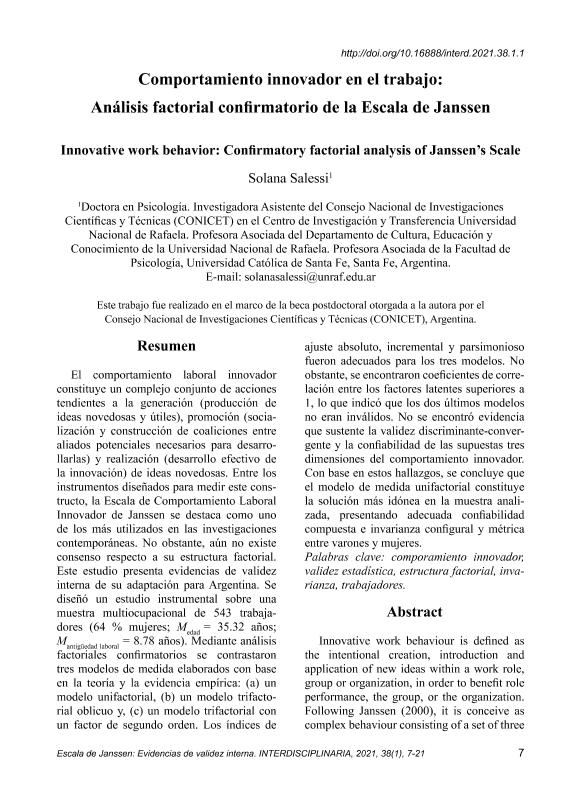Mostrar el registro sencillo del ítem
dc.contributor.author
Salessi, Solana Magalí

dc.date.available
2022-04-29T19:58:15Z
dc.date.issued
2021-01
dc.identifier.citation
Salessi, Solana Magalí; Comportamiento innovador en el trabajo: Análisis factorial confirmatorio de la Escala de Janssen; Centro Interamericano de Investigaciones Psicológicas y Ciencias Afines; Centro Interdisciplinario de Investigaciones en Psicología Matemática y Experimental; Interdisciplinaria; 38; 1; 1-2021; 7-21
dc.identifier.issn
0325-8203
dc.identifier.uri
http://hdl.handle.net/11336/156159
dc.description.abstract
El comportamiento laboral innovador constituye un complejo conjunto de acciones tendientes a la generación (producción de ideas novedosas y útiles), promoción (socialización y construcción de coaliciones entre aliados potenciales necesarios para desarrollarlas) y realización (desarrollo efectivo de la innovación) de ideas novedosas. Entre los instrumentos diseñados para medir este constructo, la Escala de Comportamiento Laboral Innovador de Janssen se destaca como uno de los más utilizados en las investigaciones contemporáneas. No obstante, aún no existe consenso respecto a su estructura factorial. Este estudio presenta evidencias de validez interna de su adaptación para Argentina. Se diseñó un estudio instrumental sobre una muestra multiocupacional de 543 trabajadores (64 % mujeres; Medad = 35.32 años; Mantigüedad laboral = 8.78 años). Mediante análisis factoriales confirmatorios se contrastaron tres modelos de medida elaborados con base en la teoría y la evidencia empírica: (a) un modelo unifactorial, (b) un modelo trifactorial oblicuo y, (c) un modelo trifactorial con un factor de segundo orden. Los índices de ajuste absoluto, incremental y parsimonioso fueron adecuados para los tres modelos. No obstante, se encontraron coeficientes de correlación entre los factores latentes superiores a 1, lo que indicó que los dos últimos modelos no eran inválidos. No se encontró evidencia que sustente la validez discriminante-convergente y la confiabilidad de las supuestas tres dimensiones del comportamiento innovador. Con base en estos hallazgos, se concluye que el modelo de medida unifactorial constituye la solución más idónea en la muestra analizada, presentando adecuada confiabilidad compuesta e invarianza configural y métrica entre varones y mujeres.
dc.description.abstract
Innovative work behaviour is defined as the intentional creation, introduction and application of new ideas within a work role, group or organization, in order to benefit role performance, the group, or the organization. Following Janssen (2000), it is conceive as complex behaviour consisting of a set of three different behavioural tasks: idea generation (the production of novel and useful ideas in any domain), idea promotion (the socialization of ideas and built of a coalition of supporters among potential allies such as friends and sponsors, who provide the necessary power and resources to develop the idea), and idea realization (the production of a prototype or model of the innovation that can be experienced and ultimately applied). Although innovative work behaviour is theoretically treated as multi-dimensional, available measures are mostly one-dimensional. Also, the empirical evidence for the validity of innovative work behaviour measures is limited. The Innovative Work Behavior Scale of Janssen (2000) stands out as one of the most measures used in contemporary research. However, there is still no consensus regarding its uni or tri-factorial structure. This study presents evidence of internal validity of the Janssen´s Innovative Work Behavior Scale. An instrumental study was designed on a multi-oupational sample of 543 workers (64 % women, M age = 35.32 years, labor Mseniority = 8.78 years). Innovative work behaviours were measured with an argentinean adaptation of Janssen ´s scale. The scale consist in 9 item and it was completed by the own respondents (self-report). The response format was a 5-point scale ranging from ‘never’ (1) to ‘always’ (5). Confirmatory factorial analysis were conducted to examinate the scale´s dimensionality. Three measurement models (based on theory and empirical evidence) was estimated: (a) a uni-factorial model, (b) an oblique tri-factorial model and, (c) a tri-factorial model with a second-order factor. Values of absolute, incremental and parsimonious fit were within adequated ranges. Nevertheless, the correlation coefficients between the latent factors indicated problems in the estimation of the last two models (b and c). Specifically, the intercorrelations between idea realization and idea generation factor, as well as between the last one and idea promotion were above 1. This result indicated that a multi-dimensional structure was invalidate. In the same way, the average variance extracted (AVE) and the composite reliability (CR) indixes showed no evidence to support the discriminant-convergent validity and the reliability of the supposed three dimensions of innovative behavior. Given these results, it is concluded that the uni-factorial measurement model is the most suitable solution in the analyzed sample. This model showed adequate composite reliability, as well as configural and metric invariance between men and women. In line with own Janssen (2000) the dimensions may be to combine additively to create an overall scale of innovative work behavior. Future work should explore the nomological network of innovatiwe work behaviours in order to obtain more robust evidence for construct validity. Although some further research is needed, this study has tried to provide evidence of internal validity of a simple and pratical measure that is suitable for different work contexts, especially when innovative efforts are needed from all employees. It can be used in further research aimed to enhance our understanding of individual innovation. Keywords: innovative work behavior, statistical validity, factorial structure, invariance, workers.
dc.format
application/pdf
dc.language.iso
spa
dc.publisher
Centro Interamericano de Investigaciones Psicológicas y Ciencias Afines; Centro Interdisciplinario de Investigaciones en Psicología Matemática y Experimental
dc.rights
info:eu-repo/semantics/openAccess
dc.rights.uri
https://creativecommons.org/licenses/by-nc-sa/2.5/ar/
dc.subject
COMPORTAMIENTO INNOVADOR
dc.subject
VALIDEZ ESTADISTICA
dc.subject
ESTRUCTURA FACTORIAL
dc.subject
INVARIANZA
dc.subject.classification
Otras Psicología

dc.subject.classification
Psicología

dc.subject.classification
CIENCIAS SOCIALES

dc.title
Comportamiento innovador en el trabajo: Análisis factorial confirmatorio de la Escala de Janssen
dc.title
Innovative work behavior: Confirmatory factorial analysis of Janssen’s Scale
dc.type
info:eu-repo/semantics/article
dc.type
info:ar-repo/semantics/artículo
dc.type
info:eu-repo/semantics/publishedVersion
dc.date.updated
2022-03-31T16:30:55Z
dc.identifier.eissn
1668-7027
dc.journal.volume
38
dc.journal.number
1
dc.journal.pagination
7-21
dc.journal.pais
Argentina

dc.journal.ciudad
Buenos Aires
dc.description.fil
Fil: Salessi, Solana Magalí. Consejo Nacional de Investigaciones Científicas y Técnicas. Centro Científico Tecnológico Conicet - Rosario; Argentina. Universidad Católica de Santa Fe; Argentina. Consejo Nacional de Investigaciones Científicas y Técnicas. Centro de Investigaciones y Transferencia Rafaela - Universidad Nacional de Rafaela. Centro de Investigaciones y Transferencia Rafaela; Argentina
dc.journal.title
Interdisciplinaria
dc.relation.alternativeid
info:eu-repo/semantics/altIdentifier/url/http://www.ciipme-conicet.gov.ar/ojs/index.php?journal=interdisciplinaria&page=article&op=view&path[]=512
dc.relation.alternativeid
info:eu-repo/semantics/altIdentifier/doi/http://doi.org/10.16888/interd.2021.38.1.1
Archivos asociados
